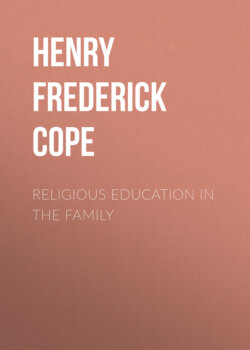Читать книгу Religious Education in the Family - Henry Frederick Cope - Страница 8
На сайте Литреса книга снята с продажи.
§ 4. THE COST OF A FAMILY
ОглавлениеTaking the home in religious terms will mean, then, conceiving it as an institution with a religious purpose, namely, that of giving to the world children who are adequately trained and sufficiently motived to live the social life of good-will. The family exists to give society developed, efficient children. It fails if it does not have a religious, a spiritual product. It cannot succeed except by the willing self-devotion of adult lives to this spiritual, personal purpose.
A family is the primary social organization for the elementary purpose of breeding the species, nurturing and training the young. This is its physiological basis. But its duties cannot be discharged on the physiological plane alone. This elementary physiological function is lifted to a spiritual level by the aim of character and the motive of love. Families cannot be measured by their size; they must be measured by the character of their products. If quality counts anywhere it counts here, though it is well to remember that it takes some reasonable quantity to make right quality in each.
The family needs a religious motive. It demands sacrifice. To follow lower impulses is to invite disaster. The home breeds bitterness and sorrow wherever men and women court for lust, marry for social standing, and maintain an establishment only as a part of the game of social competition. To sow the winds of passion, ease, idle luxury, pride, and greed is to reap the whirlwind. Moreover, it is to miss the great chance of life, the chance to find that short cut to happiness which men call pain and suffering.
A family is humanity's great opportunity to walk the way of the cross. Mothers know that; some fathers know it; some children grow up to learn it. In homes where this is true, where all other aims are subordinated to this one of making the home count for high character, to training lives into right social adjustment and service, the primary emphasis is not on times and seasons for religion; religion is the life of that home, and in all its common living every child learns the way of the great Life of all. In vain do we torture children with adult religious penances, long prayers, and homilies, thinking thereby to give them religious training. The good man comes out of the good home, the home that is good in character, aim, and organization, not sporadically but permanently, the home where the religious spirit, the spirit of idealism, and the sense of the infinite and divine are diffused rather than injected. The inhuman, antisocial vampires, who suck their brothers' blood, whether they be called magnates or mob-leaders, grafters or gutter thieves, often learned to take life in terms of graft by the attitude and atmosphere of their homes.1
